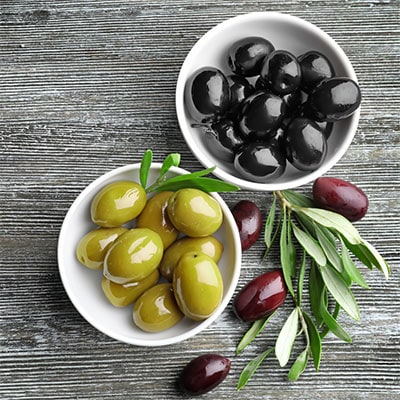The life span of an olive tree ranges from 300 to 600 years. Typically, olives are first harvested after 15 years.
 Background
Background
- Olives are a member of the Oleaceae botanical family.
- Olives are a fruit, known as a drupe that grow on a small tree or shrub.
- There are over a thousand varieties of olives grown throughout the world, though an estimated 139 varieties account for 85% of olive production around the world.
- Olives contain oleuropein, a bitter component which requires olives go through a curing/brining process prior to production. These steps make the olives palatable.
- Olive oil is produced by extracting oil from the pulp of the fruit. There are different extraction processes depending on the type of olive oil being made.
Nutrition
- Olives are an excellent source of iron and a good source of copper.
- Iron supports growth and development, immune function, wound healing, reproduction, and energy production.
- Copper assists with bone formation, energy production, iron metabolism, and nervous system function.
- Use caution if you are on a low sodium diet. Olives are high in sodium due to the processing method.
How to Purchase, Prepare, and Store
- Purchase olives at grocers year-round.
- Olives can be purchased canned or jarred. Many varieties are available including many specialty brands that offer stuffed olives.
- Prepare olives as directed per recipe.
- Add olives to salads or other dishes; chop or puree to create delicious dips.
- Store unopened cans of olives in a cool dark place. Once open, place olives in an airtight container in the refrigerator.
Nutrition Facts
1/2 cup black olives (67.5 grams)
- Calories: 78.5
- Protein: 0.56 g
- Fat: 7.3 g
- Carbohydrate: 4.0 g
- Fiber: 1.0 g
- Calcium: 59.5 mg
- Iron: 4.2 mg
- Magnesium: 2.7 mg
- Phosphorus: 2.0 mg
- Folate: 0 µg
- Vitamin A: 11.5 µg
1/2 cup green olives (67.5 grams)
- Calories: 98
- Protein: 0.69 g
- Fat: 10.3 g
- Carbohydrate: 2.5 g
- Fiber: 2.2 g
- Calcium: 35.1 mg
- Iron: 0.33 mg
- Magnesium: 7.4 mg
- Phosphorus: 2.7 mg
- Folate: 2.0 µg
- Vitamin A: 13.5 µg
Via fdc.nal.usda.gov
Recipes
Request an Appointment